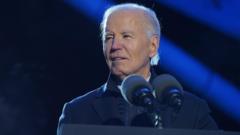In a move that could reshape political discourse, President Joe Biden is reportedly contemplating pre-emptive pardons for prominent critics of Donald Trump as part of a strategy to protect them from potential retaliation if Trump reclaims the presidency. According to sources familiar with the matter, Biden's discussions have involved senior White House aides, although no individuals have been formally recommended for such pardons at this time.
The consideration follows Biden's controversial pardon of his son, Hunter Biden, a decision that has met with backlash from both Republicans and some Democrats. The context of Hunter's pardoning – in light of pending felony charges – raises critical questions about the nature of presidential pardons, particularly regarding individuals who have not committed crimes.
In the political sphere, figures such as Dr. Anthony Fauci and California Senator Adam Schiff have been mentioned as potential candidates for these pre-emptive pardons, given their outspoken criticism of Trump. Schiff, notably involved in the Trump impeachment inquiries, has voiced skepticism about the necessity of such pre-emptive measures, arguing that the judicial system should be able to withstand threats from the former president.
White House Press Secretary Karine Jean-Pierre indicated that more pardons could be forthcoming before Biden's term concludes in January, suggesting a broad review process surrounding the implications of pardons. In contrast, discussions around traditional pardons for non-violent drug offenders are also expected, indicating a dual approach to clemency decisions.
The reality of Trump's potential return to power adds layers of complexity to Biden's considerations. Trump's nominated FBI Director, Kash Patel, has made clear intentions to pursue those he believes have opposed Trump's agenda if he assumes office. Comments from Congressman Brendan Boyle echo the sentiment that pre-emptive pardons may be necessary to combat what some perceive as a hostile political environment.
As this story unfolds, the implications of Biden’s potential actions on the American political landscape are vast, questioning the essence of justice, the legacy of presidential power, and the ongoing political divide in the United States.
The consideration follows Biden's controversial pardon of his son, Hunter Biden, a decision that has met with backlash from both Republicans and some Democrats. The context of Hunter's pardoning – in light of pending felony charges – raises critical questions about the nature of presidential pardons, particularly regarding individuals who have not committed crimes.
In the political sphere, figures such as Dr. Anthony Fauci and California Senator Adam Schiff have been mentioned as potential candidates for these pre-emptive pardons, given their outspoken criticism of Trump. Schiff, notably involved in the Trump impeachment inquiries, has voiced skepticism about the necessity of such pre-emptive measures, arguing that the judicial system should be able to withstand threats from the former president.
White House Press Secretary Karine Jean-Pierre indicated that more pardons could be forthcoming before Biden's term concludes in January, suggesting a broad review process surrounding the implications of pardons. In contrast, discussions around traditional pardons for non-violent drug offenders are also expected, indicating a dual approach to clemency decisions.
The reality of Trump's potential return to power adds layers of complexity to Biden's considerations. Trump's nominated FBI Director, Kash Patel, has made clear intentions to pursue those he believes have opposed Trump's agenda if he assumes office. Comments from Congressman Brendan Boyle echo the sentiment that pre-emptive pardons may be necessary to combat what some perceive as a hostile political environment.
As this story unfolds, the implications of Biden’s potential actions on the American political landscape are vast, questioning the essence of justice, the legacy of presidential power, and the ongoing political divide in the United States.






















